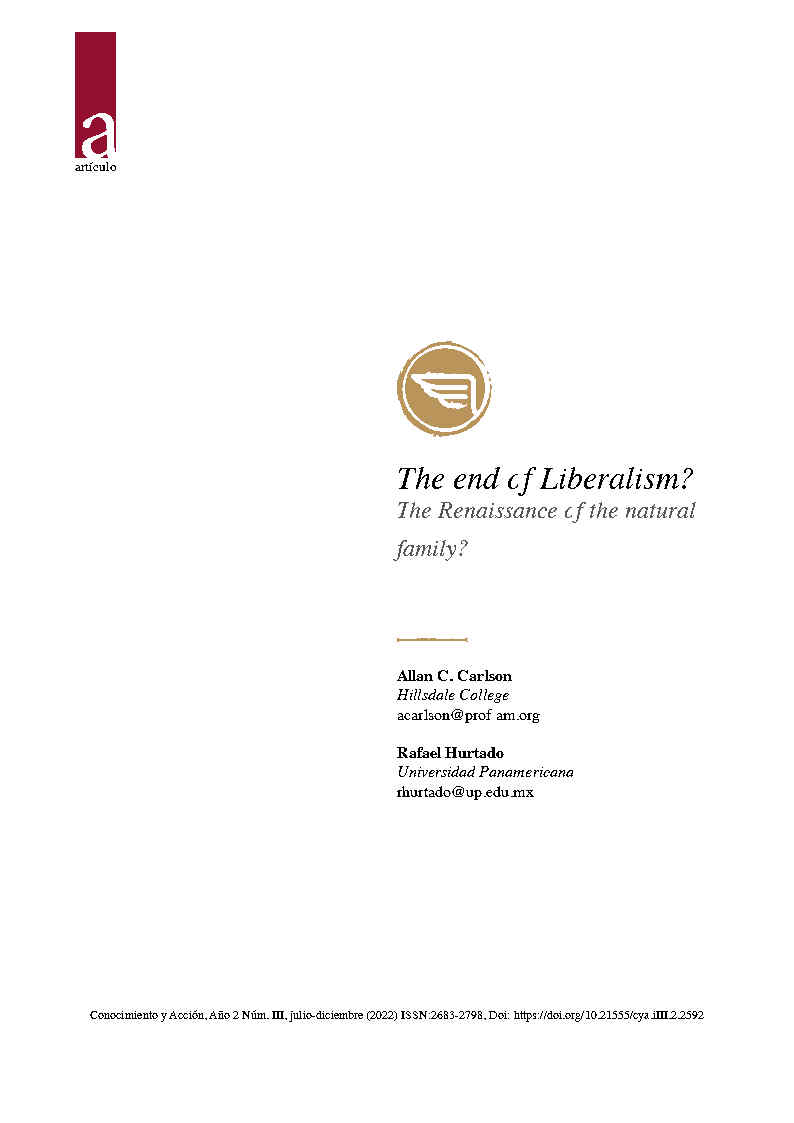
Publicado 04-07-2022
Palabras clave
- Liberalismo,
- Familia,
- Paternidad,
- Tolerancia,
- Cristianismo
Derechos de autor 2022 Conocimiento y Acción

Esta obra está bajo una licencia internacional Creative Commons Atribución-NoComercial-CompartirIgual 4.0.
Cómo citar
Resumen
En el presente artículo se argumentará que el sistema familiar liberal, tal como fue concebido por el teórico-político británico John Locke a finales del siglo XVII, gozoso de un aparente éxito a fines de la década de 1960, se encuentra actualmente en ruinas. Tres contradicciones internas que derribaron el sistema pueden ser identificadas: 1) una comprensión deficiente de la naturaleza humana, la cual denigró la imagen del varón y colocó una carga familiar excesiva sobre la mujer; 2) la falta de funciones de la familia liberal, provocando su desintegración económica y material; 3) su dependencia de la ingeniería social coercitiva, que minaba los valores religiosos fundacionales que permitieron la funcionalidad del sistema conocido. La "autorrealización" y la "teoría de género", muestran Carlson y Hurtado, son la consumación lógica de dicho sistema familiar liberal, atentando directamente con la esencia de la familia natural. También se pone de manifiesto cómo y por qué el ideal liberal de tolerancia ha fallado en las últimas décadas.
Referencias
- Abbott, Phillip. The Family on Trial: Special Relationships in Modern Political Thought. University Park: The Pennsylvania State University Press, 1981.
- Andrews, Kevin & Hurtado, Rafael. «Pitirim Sorokin on Marriage, Family and Culture», The
- Chesterton Review, Vol. XLVI, N. 1 & 2, 2020: 127-139
- Andrews, Kevin. Maybe “I do.” Modern Marriage & the Pursuit of Happiness. Victoria: Connor Court, 2012.
- Alvira, Rafael & Hurtado, Rafael. «The Truth about Poverty and Wealth: Reflections on the Centrality of the Natural Family in Economics and Politics» Metafísica y Persona, Year 9, N. 18, 2017: 101-113.
- Boak, Arthur. Manpower Shortages and the Fall of the Roman Empire in the West. Ann Arbor: University of Michigan Press, 1955.
- Cleveland Coxe, Arthur. Fathers of the Third Century. New York: Christian Literature Publishing Group, 1885.
- Deneen, Patrick. Why Liberalism Failed. New Haven, CT: Yale University Press, 2018.
- Goode, William J. World Revolution and Family Patterns. New York: The Free Press of Glencoe, 1963.
- Green, Thomas H. Lectures on the Principles of Political Obligation. Ann Arbor: University of Michigan Press, 1967.
- Lane Fox, R. Pagans and Christians. San Francisco, CA: Harper and Row, 1986.
- Locke, John. Two Treatises on Government. New York: Mentor Books, 1965.
- Mill, John Stuart. The Subjection of Women. Consulted on the 21 of June of 2022 at: gutenberg.org/files/27083/27083-h/27083-h.htm
- Parkin, Tim G. Demography and Roman Society. Baltimore, MD: The Johns Hopkins University Press, 1992.
- Parsons, Talcott. The Social System. New York: The Free Press, 1951.
- Parsons, T. & and White, W. «The Link Between Character and Society». in Lipset, S. M. & Lowenthal, L. eds. Culture and Social Change. New York: The Free Press of Glencoe, 1961, pp. 89-135.
- Rawls, John. A Theory of Justice. Cambridge, MA: Harvard University Press, 1971.
- Sandison, A. T. «Sexual Behavior in Ancient Societies». in Brothwell, D. & Sandison, A. T. eds. Diseases in Antiquity. Springfield, IL: Charles C. Thomas, 1967, pp. 734-743.
- Stark, Rodney. The Rise of Christianity: A Sociologist Reconsiders History. Princeton, NJ: Princeton University Press, 1996.
- Yenor, Scott. Family Politics: The Idea of Marriage in Modern Political Thought. Waco, TX: Baylor University Press, 2011.

